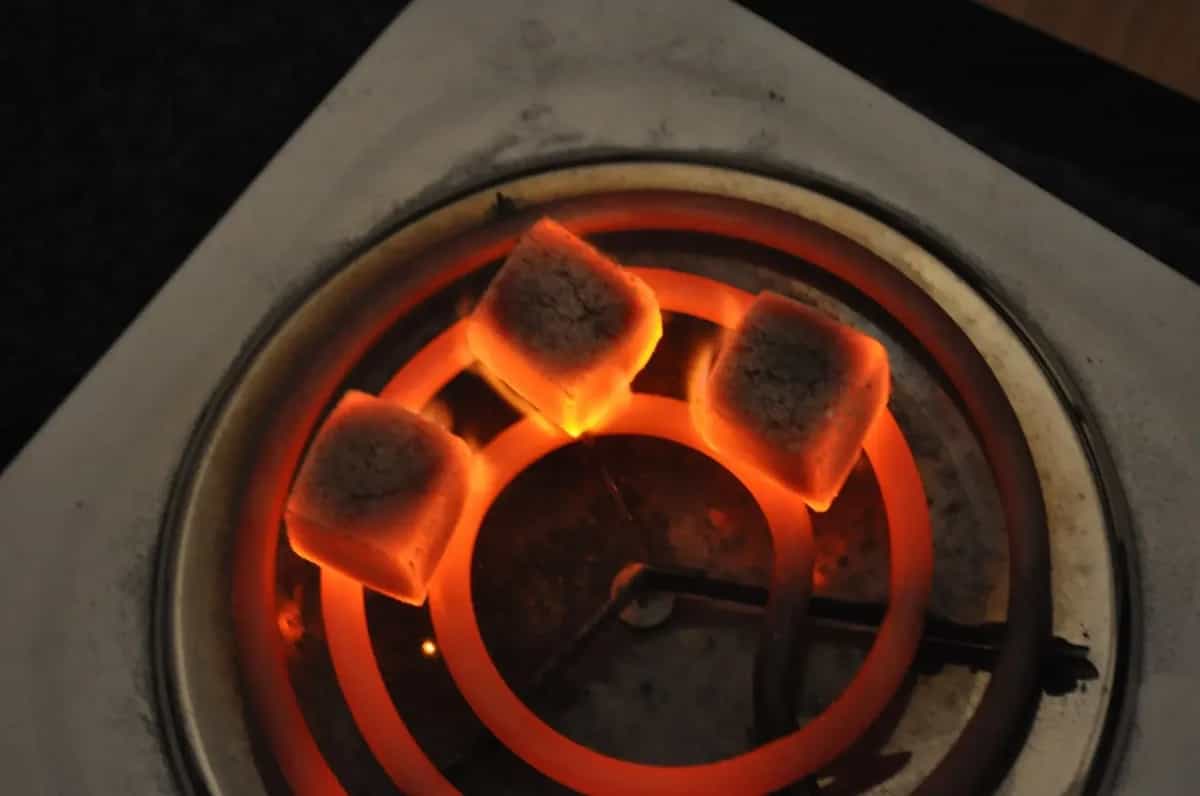Shisha Blog
The hookah Coal
All about the Coal!

It must glow hot and last a long time... The coal. Basically, you can distinguish between two types of coals: Natural coals, mostly based on coconut shells or bamboo, and the infamous self-lighter coals. Lets take a look at both types.
The hookah self-lighter coals
Any hookah smoker will turn away in disgust at the word self-lighter, but deep down we know: Everyone started using them at one time or another. Self-lighter coals are pressed carbon tablets, enriched with - no, not uranium - but various chemicals such as potassium nitrate, sulfur or magnesium. Whats the point? So that you can light them with a standard lighter. Quickly grabbed with the pliers, the flame underneath, then it crackles and sparkles nicely and when then a light layer of ash is visible (and please not before), off on the bowl and smoke. Sounds very practical at first, especially for the cozy outdoor - or festival pipe, but the downsides are often a pretty nasty aftertaste and the simple reason that the charcoal tablets do not get as hot as natural charcoal. This makes heat regulation difficult and if you have a properly moist tobacco, it just doesnt get going and neither smoke nor proper flavor develops. The beginner can make the first hops with it, try setups, but times should not linger too long with it and switch to natural coals as soon as possible. The tobacco and the taste will thank you, even if the handling is a little more complex.
The hookah natural coals
Free of chemicals, available in chic cubes in various sizes, wonderfully hot and enduring: hello natural coals. These lumps of coal are mostly made of pressed coconut shells or bamboo and provide hookah fun for hours without running out of puff all too quickly. Since there is no automatic ignition built into the cubes, they need some aid to get the spark going. The most common means for this is either a good gas burner with a cartridge or one of the many electric charcoal lighters available on the market. Both types will light your coals quickly and cleanly, but make sure that you dont buy the cheapest models. This is important to me especially with the gas burners. Many hardware stores offer the burners with tens of cartridges for a tired tenner, but: You handle gas and fire and since the lighting of the coal can take 10 minutes, you may not be standing next to it and watching. Of course, there are many who say: My DIY burner already lasts 38 years without breaking. Sure, there are those too, but I personally dont have much confidence in these rattling parts. As far as electric lighters are concerned, this is how it works: plug it in, turn the switch on, and wait until the coals are ready. The Elephant lighter is probably the most common, costs around 25 euros, solidly made. Unfortunately, the lifetime of these devices (as well as all the replicas and clones) varies from 3 days to several years. Since the lighter provides to put the coals directly on the heating coil, it can quickly happen that material flakes off. With a suitable grid over the coil, you can extend the life and preserve the unit. Mine has been alive for a good 2.5 years, has survived the one or other downpour, is cleanly finished and stable. Otherwise, there are of course other devices that can be used for coal lighting, such as converted raclette grills or electric stove tops. Stores such as Poco often offer a selection of such devices from dubious manufacturers at low prices, but you should be aware that you are also buying a device that can spark to death after a few days. Of course, there are also clever ideas for outdoor use, if you do not want to do without your natural coals even in the pampas. For example, you can simply use the cheap self-igniter to ignite the natural coals in combination with a nice windbreak made of aluminum foil. Just stack 2-3 of them on the self-lighter and let the windbreak and chimney effect do the rest. The summary (or who is too lazy to read):
Self-ignitors are a makeshift solution, do not burn as hot as natural coals, can have a nasty taste of their own, but are dirt cheap. If there is no other way, at least take Carbopol self-igniters, which are qualitatively still the best. Alternatively, use natural coals for outdoor lighting.
Natural coals come without chemistry in versch. Sizes (standard is 25x25x25mm), priced at around 5 euros / kilo. Well-known and excellent brands are e.g. Cocobrico, Al Duchan Platin, Coco Palm or Starbuzz Cocobuzz 2.0, Dschinni Cubes.
Natural coals need thrust from the outside, either by a gas burner or an electric charcoal lighter.
No matter which device is suitable for you, please do not buy the cheapest stuff from the hardware store. Campingaz offers good quality gas burners at fair prices. With the electric ones the classic of Elephant or equivalent clones lie like the Al Duchan Hellblazer and the Amy Deluxe Primer on the upper ranks. Disadvantage of the electric lighters: They die gladly times from Monday to Tuesday. Nevertheless, the, in my opinion, most elegant solution for lighting coal, especially if you smoke mainly at home or indoors.
Please use hookah charcoal only and no barbecue charcoal or briquettes. The stuff you do not want to additionally press into the lungs ...